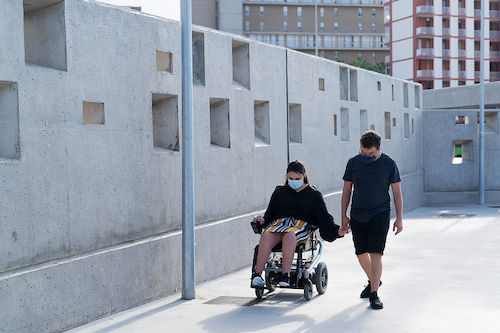 Those living with disabilities during the COVID-19 pandemic are experiencing high levels of depression and anxiety.
Those living with disabilities during the COVID-19 pandemic are experiencing high levels of depression and anxiety.
Researchers from Yale, Oregon State University, Olin College of Engineering, Hiram College and Macalester College found that there has been a significant increase in the number of people with disabilities living with depression since the start of the pandemic.
“While the COVID-19 pandemic has been a challenging time for everyone, it has disproportionately impacted marginalized populations by exacerbating existing health inequities and systematic oppression,” Katie Wang, PhD, co-author of the study and an Assistant Professor at Yale School of Public Health told Theravive.
Wang was inspired to undertake the study after witnesses the challenges faced by those in the disability community since the pandemic began.
Medical rationing, problems accessing vaccination or testing services and inability to safely follow COVID-19 mitigation tactics like social distancing, Wang says, are just some of the challenges facing those in the disabled community during the pandemic.
“People with physical disabilities who require assistance with daily living activities do not have the option to socially distance from their caregivers, mask-wearing makes communication difficult for people who are deaf or hard of hearing. In light of these challenges, I decided to conduct an online survey to better understand the pandemic’s mental health impact on U.S. adults with disabilities, who, at 25% of the general population, represent one of the largest minority groups in our country.”
The survey polled 441 adults who self-identified as disabled.
Of those surveyed, 61% of people fulfilled the criteria for probable major depressive disorder, whilst 50% met the criteria for probable generalized anxiety disorder.
That represents a significant jump on data from before the pandemic began. Previous studies suggest that roughly 22% of those living with a disability will experience depression at some stage.
“We also found that social isolation, disability-related stigma, and worries about contracting COVID-19 were positively associated with both depression and anxiety symptoms; people with multiple disabilities, pre-pandemic mental health conditions, or chronic pain were also at elevated mental health risk,” Wang said.
Social isolation was the main predictor of both anxiety and depression, with those in the disabled community experiencing even higher levels of social isolation during the pandemic than they did previously.
Many living with disabilities have comorbidities that place them at risk from significant complications or severe infection due to COVID-19. Many in the disabled community are also immunocompromised, warranting the need for strict isolation measures.
“This finding points to the value of virtual communities and support groups that connect people with disabilities with one another, which can mitigate social isolation while also facilitating stigma coping by providing a sense of solidarity,” Wang said.
Disability related stigma and ableism was another predictor for depression and anxiety among those surveyed.
At various stages of the pandemic, policies surrounding medical rationing implied those with a disability were a lower priority in terms of allocation of COVID-19 resources like ventilators.
Wang says the findings of the study reinforce the importance of making services available for everyone, regardless of health status.
“Educating healthcare providers about explicit and implicit forms of ableism would help combat the pervasiveness of disability-related stigma in healthcare settings and mitigate disabled people’s worries about contracting COVID-19, which are in part driven by the fear that they would not be able to receive equitable care if they were to become ill,” she told Theravive.
“More funding should be dedicated to targeted interventions for people with disabilities who need additional support, such as home visits from healthcare professionals and assistance with daily living activities.”
She says policy makers also have a role to play in ensuring that public health services and public health information are made accessible to all members of the community.
“Efforts should be made to increase the accessibility of COVID testing and vaccine sites, and assistance such as transportation should be provided to those who need help with accessing these services,” she said.
Elizabeth Pratt is a medical journalist and producer. Her work has appeared on Healthline, The Huffington Post, Fox News, The Australian Broadcasting Corporation, The Sydney Morning Herald, News.com.au, Escape, The Cusp and Skyscanner. You can read more of her articles here. Or learn more about Elizabeth and contact her via her LinkedIn and Twitter profiles.